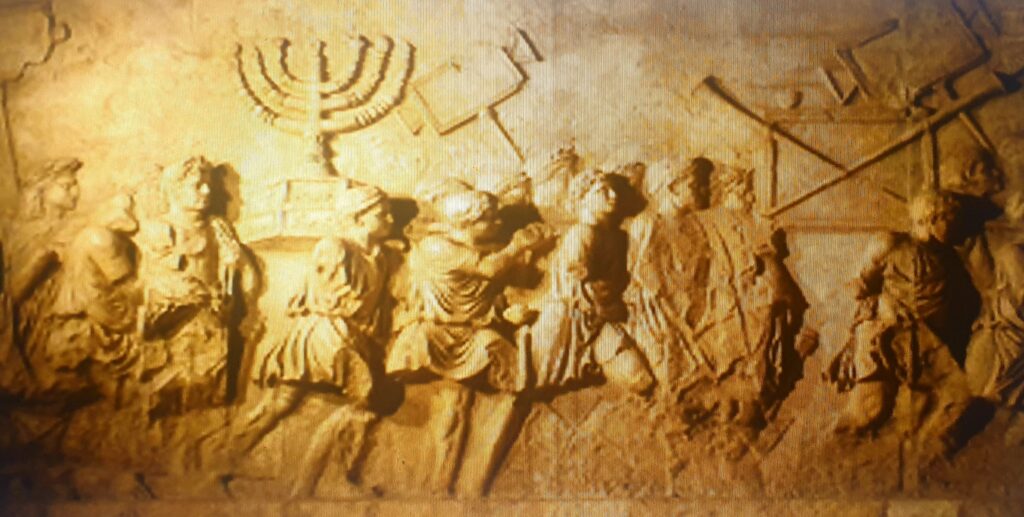In the book of Esther, the administrator to the King of Persia was Haman the Agagite who held the second highest position in the land. Like the antichrist, Haman was moved by Satan to totally eradicate the Jews who lived in the Kingdom of the Medes and Persians during the reign of King Ahasuerus (aka Xerxes I) 486-465,64 B.C.
Haman hated Mordecai the Jew. Since Mordecai refused to bow down to Haman or pay him homage like everyone else in the king’s court, Haman was filled with wrath against Mordecai. When Haman learned that Mordecai was a Jew, Haman sought to destroy all of Mordecai’s people living throughout the whole kingdom of Ahasuerus.
Readings from Esther 3:5-14
“In the month of Nisan, in the twelfth year of King Ahasuerus, they cast Pur (that is, the lot, hence the word Purim), before Haman to determine the day and the month of the Jewish massacre until it fell on the twelfth month, which is the month of Adar.”
Haman said to King Ahasuerus, “There is a certain people scattered and dispersed among the people in all the provinces of your kingdom; their laws are different from all other people’s, and they do not keep the king’s laws. Therefore, it is not fitting for the king to let them remain. If it please the king, let a decree be written that they be destroyed, and I will pay ten thousand talents of silver into the hands of those who do the work, to bring it into the king’s treasuries.” (Esther 3:8)
The king refused to take the bribe but granted Haman his request. He gave Haman, the enemy of the Jews his signet and told Haman to do to the Jews as he pleased. So, in the name of Ahasuerus and sealed with the king’s signet ring, the decree was written to destroy, to kill, and to annihilate all the Jews, both young and old, little children and women, in one day, on the thirteenth day of the twelfth month – the month of Adar, and to plunder their possessions.
Mordecai, a God-fearing Jew, had raised orphan Hadassah (later named Esther) to be a God-fearing young lady. Hadassah was the most beautiful of all the women selected for the harem and was chosen by the King of Persia to be his queen in place of Queen Vashti. (Esther 2:17)
Mordecai, however, instructed Esther not to reveal her heritage.

While Esther was at the king’s harem, Mordecai learned about Haman’s plan, and the king’s edict to destroy the Jewish people. Mordecai then ordered Queen Esther to appear before the king and plead for the survival of her people.
Mordecai challenged Esther by saying: “Do not think in your heart that you will escape in the king’s palace any more than all the other Jews. For if you remain completely silent at this time, relief and deliverance will arise for the Jews from another place, but you and your father’s house will perish. Yet who knows whether you have come to the kingdom for such a time as this?” Esther 4:13-16
Queen Esther knew that only another royal decree issued by the king could save her people. No Persian royal decree could be rescinded. She had to arrange an audience with the King.
Esther instructed all the Jews in the capital city of Susa to fast for three days, neither eating nor drinking for a full three days and nights during which time she and her maids would likewise fast.
And Queen Esther declared: “so I will go to the king, which is against the law; and if I perish, I perish!” Esther 4:15-17 (Today, in commemoration of that fast, many Jews fast the day before Purim, praying for God’s continual preservation of Israel.)
In Persia, it was illegal to come before the king uninvited unless he extended his royal scepter.
Nevertheless, on the third day of the fast, Esther, dressed in her royal attire, appeared in front of the hall where the king sat on his throne. When the king saw his beautiful queen, he remembered how much he loved her and extended the golden royal scepter, inviting her to approach him.
“what is your request and I will grant you up to half the kingdom.” said the king.
Esther requested that the king attend a private banquet she had prepared in his honor and bring Haman as a guest. Neither of them knew that Esther was Jewish.
As they were enjoying the food and wine, the king sensed there was something more and asked her again, “what is your request, and I will grant it up to half the kingdom.”
Esther requested that they come again the next day to a second private banquet.
Haman was elated to realize that he was the only one, besides the king who was invited by the queen to the private banquet. But when he saw Mordecai at the king’s gate still ignoring him, showing him no respect, he was again filled with rage.
Nevertheless, Haman restrained himself and went home to boast to all his friends about his vast wealth, his many sons, and the fact that the king honored him in so many ways and elevated him above all others in the kingdom so much so that he was the only one invited to accompany the king to the Queen’s banquet.
Even with his accomplishments and success, Mordechai’s refusal to bow down to him enraged him. Haman’s wife Zeresh and all his friends suggested he erect a high pole up and hang Mordechai on it. This idea delighted Haman, and so he had the pole set up and went happily to the banquet.
As they were enjoying the food and drinks, the king again asked, “Queen Esther, What is your request? Even up to half the kingdom, it will be granted.”
This time, Queen Esther revealed she was Jewish and asked that her life and the lives of her Jewish people be spared.
“This is my request, for I and my people have been sold to be destroyed, killed, and annihilated. Had we merely been sold as slaves, I would have kept quiet and not disturb the king.” (Esther 5:4)
When the king asked who would dare do such a thing, Esther pointed to Haman and said, “An adversary and enemy! This wicked Haman!” The king was enraged and went out to the garden to absorb all this new twist of events.
Haman, terrified about what the king would do to him, fell on Esther’s couch and begged Esther for his life. At that very moment, the King returned from the palace garden to see Haman falling on the couch where his beloved Esther was reclining. In his rage he exclaimed,
“Will he (Haman) even molest the queen while she is with me in the house?” (Esther 5:8)
When one of his eunuchs told the king that Haman had a very high pole set up to hang Mordechai the Jew, the king ordered Haman to hang on it instead of Mordechai.
The king gave Haman’s estate to Esther, and after learning how Esther was related to Mordechai he gave Mordechai the honor of being in the highest position that Haman had held, second only to the king, and gave him the signet ring he took from Haman.
Then Esther begged the king to save the Jews:
“If it pleases the king,” she said, “and if he regards me with favor and thinks it the right thing to do, and if he is pleased with me, let an order be written overruling the dispatches that Haman son of Hammedatha, the Agagite, devised and wrote to destroy the Jews in all the king’s provinces. For how can I bear to see disaster fall on my people? How can I bear to see the destruction of my family?” (Esther 8:5-6 NIV)
The king gave Esther and Mordechai permission to write a new order and seal it with the signet ring he gave to Mordechai. A copy of the text of the edict was to be issued as law in every province and every nationality in the kingdom.
The new edict granted the Jews in every province the right to defend themselves, to destroy, kill, and annihilate the armed men of any nationality or province who might attack them and their women and children, and to plunder the property of their enemies.
And the city of Susa held a joyous celebration. For the Jews, it was a time of happiness and joy, gladness and honor. In every province and in every city to which the edict of the king came, there was joy and gladness among the Jews, with feasting and celebrating. And many people of other nationalities became Jews because fear of the Jews had seized them. (Esther 8:15-17)
Thus the Purim holiday was established for all generations.
Although God’s name is never mentioned in the Book of Esther, His sovereignty and Presence are evident as He brings a perfect ending to what seems to be a disastrous situation.
“Am I a God near at hand,” says the Lord, “and not a God afar off? Can anyone hide himself in secret places, so I shall not see him?” says the Lord; “Do I not fill heaven and earth?” says the Lord. Jeremiah 23:23-24
The Miracle of Purim was the Turnaround of Events
On the same date, the thirteenth day of the twelfth month, that is, the month of Adar when the enemies of the Jews had hoped to destroy them, was the time that the new edict and decree of the king was to be executed. On that day, the opposite occurred (Haafoh hu in Hebrew), in that the Jews themselves overpowered those who hated them. The Jews gathered together in their cities throughout all the provinces of King Ahasuerus to lay hands on those who sought their harm. And no one could withstand them, because fear of them fell upon all people. (Esther 9:1-2)
(Image Attribution: Jared Subia, Unsplash)



